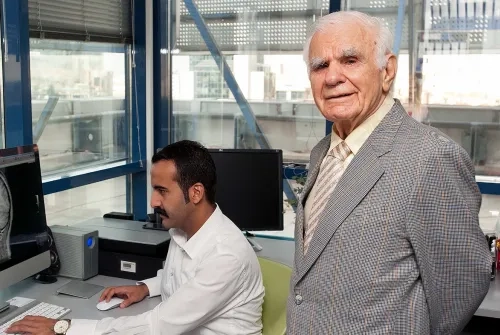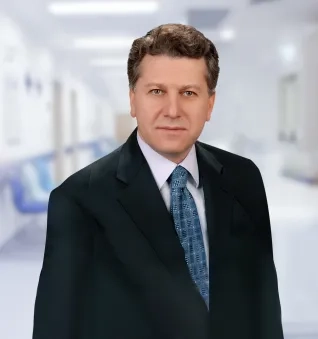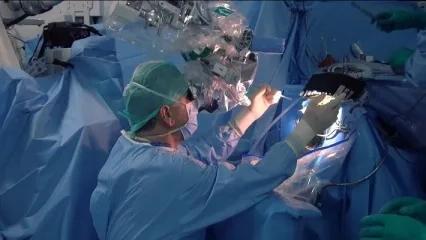Alo Yeditepe
Cause to Rejoice: Yeditepe is Nurturing Great Scientists
Renowned brain and neuro surgeon Prof. Dr. Gazi Yaşargil has come back to Turkey after living abroad for 70 years. And his work at Yeditepe University Hospital goes on.
As I told him the moment we met, I had been excited about doing this interview right from the moment the idea first struck me. In fact there were both personal and professional reasons behind my being so keen to meet the celebrated brain and neuro surgeon Professor Yaşargil. Years ago he had brought a close relative, and a few months ago a beloved friend’s mother, back to life. That was the personal bit. Professionally, I thought this was just the right time to have a talk about brains. 2014 had been declared the “Year of the Brain” in Europe by the European Brain Council, the European Parliament and the European Council, in the wake of which the Turkish Neurologic Association initiated the Year of the Brain in Turkey project. Two years ago the Nobel Prize in Physiology or Medicine had been awarded to three scientists (John O’Keefe, May-Britt Moser and Edward Moser) who had answered the question “How does our brain know where we are and where we are going?” And an event had been organized in honor of Gazi Yaşargil, who had decided to continue his work at Yeditepe University Hospital over the past two years.
“A Long Operation Awaits You”
In 1973, the methods developed by Ordinarius Professor Yaşargil (now 89) inaugurated a new era in neurosurgery. The founding father of micro neurosurgery, he had received countless awards including ‘Neurosurgery’s Man of the Century’ by the journal Neurosurgery at the Congress of Neurological Surgeons Annual Meeting in 1999. After 70 years living abroad, he returned to Turkey in 2013.
Making news this week with a masterclass he gave at Ege University’s inaugural event, Yaşargil met with me at his office in the hospital, and we took a tour of his laboratory. He patiently answered all my questions for the two hours our discussion lasted. He drew sketches and showed a model to explain how the brain is an organ of miracles.
I also had the opportunity to meet Yaşargil’s elegant wife (and working partner) Dianne, who referenced my interview notes as I departed with the words “A long operation awaits you.” Well, the operation has ended, so here you are..
How much does mankind really know about the brain in 2016?
Enough to fill a fig seed. The brain is an enigmatic structure. The heart, the kidneys, the lungs - they all have the same tissue structure. But the brain has tens of thousands of different kinds of cells. And there are endless connections between these cells…
We know much more than we did 100 years ago. In the year 1900 there were at most 1,000 people working in this field. Today the number is two to three million people. But there is still no cure for diseases such as Alzheimer’s, Parkinson’s, ALS, and MS.
There is still no effective medication against malignant tumors. Now you are with me. You might like me or not, some feeling on the matter crosses your mind. My brain perceives this. We have no idea how this happens.
Of all the unknowns, which intrigues you most?
Where do these tumors come from? I hope this question will be answered.
Are patients now more aware than they were when you embarked on your career? Some people come having diagnosed themselves over the internet. Does this make you cross?
People sometimes come confused by reading inaccurate things. But I don’t get cross. It just takes a long time to explain. Because everyone brings a world with them, every brain is infinite…
Which diseases or conditions have become more prevalent?
None. They used to go undiagnosed. Now they can be diagnosed.
Has the mortality rate from brain diseases fallen a lot?
The mortality risk of aneurism, vascular bundle and benign tumor surgery has fallen to 0.5%. With the techniques we have developed, the surgical risk is now at the same level as appendicitis operations. The risk of paralysis is close to zero. And another thing: it used to be said that if a tumor crops up in one place, it will spread elsewhere. The crux of my six-volume thesis was that: the tumor stays where it emerged from. Because the place it is said to spread to is another world altogether.
Tumors are treatable because 60% are benign but whether they are benign or not, they need to be entirely removed. 5% of malignant tumor cases sort themselves out. 5% of patients live for three to four years. We lose 90% within one or two years. Before, those that caused seizures (about 1% of cases) used to be entirely removed with surgery. I discovered a procedure: only the tangled blood vessels or the tumor is removed, the tissue is left undamaged.
Surgeons well versed in microsurgery need to do all these things.
“We Accept All Patients”
How many doctors in Turkey are capable of carrying out these operations?
There are highly skilled doctors in Turkey and in the world but I can’t talk numbers. We have passed on our knowledge to many colleagues. Here we have Professor Uğur Türe, he performs wonderful operations. It takes a time to master neuroanatomy and microsurgery.
There are only a few people prepared to work patiently in the laboratory. And systematic training has not been possible. It’s like that around the world… The necessary laboratory environment is not being created. Is learning to play a musical instrument easy? It doesn’t happen just listening to it once. These things are not learned by observing one operation. If it were up to me I would give students an exam every month. I am still reading about anatomy and physiology. I have read these things many times before, I’ll still read them again.
What should people who do not have the chance to see you bear in mind when choosing a doctor?
Don’t wonder around from shop to shop as if you are buying a pair of shoes. Doing a little research is enough. We accept every patient who comes to us. Someone from the most remote part of Turkey found me in the States. People who really want to can find you, communication methods have developed a lot. But let me say this: people should know this and rejoice. We are also nurturing great scientists. Uğur Türe is an example of this. The greatest scientists emerged from Britain during its most difficult times in the 17th century. And they are emerging here too. This hospital has the most advanced facilities and can perform operations in the most proficient manner.
“We Never Talk During Surgery”
Your wife is a nurse. You have worked together. They say it’s difficult for a husband and wife to work together…
We’re a team. We don’t have any difficulties. Anyhow we never talk during an operation. She can see what I need on the screen, she understands and gives it to me immediately. Apart from not having to explain anything to her the best aspect of our working together is that she corrects my books. She explains the tools I think up to the engineers and craftsmen…
“The Best Thing About Turkey is That People are Interconnected”
We live faster now, we don’t eat natural foods, we are sedentary, there’s air and water pollution. How does this affect our brains?
Smoking damages our blood vessels and immune system. Alcohol damages the brain. Every kind of narcotic is really bad. But we don’t yet know how bad the effects of air, water and soil pollution are.
People are always talking about the negative effects of mobile phones especially…That is also still unknown. I recommend that children are kept away from mobile phones until the age of three because their temporal bones have not yet developed and hardened.
“I Love Yoghurt, Cheese and Milk”
What food is good for the brain?
I don’t really want to get into all that. Eat what you like, but in moderation. I love yoghurt, cheese and milk. I eat lots of salad and fruit. And I prefer only lightly salted food.
Are things like taking exercise, doing puzzles and learning a language really beneficial?
Exercise is crucial. Because it develops the muscles. The muscles produce hormones for the brain.
What about marriage, having children, holding religious faith, a stress-free life, living in a civilized country… Do such things affect our brains?
These are thing I really don’t know about. But I will say this: the best thing about Turkey is that people are interconnected. People can meet in their local neighborhood and discuss their problems. An atmosphere is loneliness is fostered in big cities. There is a universal dynamism. Civilization matures slowly. For example, the maturing not just of an individual brain but of the group brain… This will take at least one or two centuries.
What is this ‘group brain’?
There’s the brain that belongs to you, and there’s the group’s invisible social brain that belongs to you… There are a thousand and one groups in terms of quality and quantity. There are ones that contain two people, others two million! You are thinking about whether to get up or not in the morning. This goes on in your brain. The brain that makes you say “But what will my grandmother think?” after you’ve said “I’ll just sleep another five minutes” is the group’s brain. My father never wanted us to go to the cinema. Even today if I want to go to the cinema he comes to mind. Some things just stay there…
“I’m Worried About the Way the World is Going, If I Can Help One Person a Day It’s a Comfort”
They wanted to dedicate a museum to your work in the States. You didn’t agree..Because I want it to be established here. And it will be… I want a museum and a laboratory open to the public. Primary school children will come and learn what the brain is, and make copies in clay…
So are you in Turkey for good now?
We came here in August 2013. Yes we’re here now. I wanted to come back a few times before but didn’t, because the environment I wanted couldn’t be set up. I have been coming to Turkey at least twice a year to perform operations since 1995. The environment I wanted was created speedily by Yeditepe University’s founder Bedrettin Dalan.
“A person feels ashamed thinking I could have done more”
Are you happy you came back? Are you happy here?
I am happy from a professional point of view. But like everyone I am worried about the way the world is going. If I can help one person a day that’s a comfort for me. A person can be of great value to his surroundings, or even to the world.
I gather you don’t perform operations any more… How do you feel when looking on from a distance?
Even talking now I’m looking at your head in surprise thinking “How did I manage to open that up?”… It’s like a musician feels when he hasn’t played his instrument for a long time… I performed operations until the end of 2013, but I don’t do it any longer, I am working on a new book. But I’m never too far away, even if I don’t perform them myself, I do observe operations.
Are you able to sit still without doing something?
Sometimes I have difficulty keeping my hands still. Like I am making them move as if I am doing something. So I generally keep my hands in my pockets.
Many people see you as a hero. Awards, titles like ‘Neurosurgeon of the Century’.. How does all that make you feel?
A person feels ashamed thinking I could have done more. Of course I like it when I hear nice things. The methods and tools I developed help thousands of people every day… But actually, none of us is even a speck of dust in the universe…
“I Still Think About How We Lost 10-15 of My Patients”
You have spent almost all of your life working. Do you have any regrets?
I have always studied, read and written. I have always worked hard but never regretted it. I always wanted to help people. You know how famed Swiss mountain sports are right? I lived there for years but didn’t do any of them, I always looked at the mountains from a distance. Because being in the hospital held a far greater interest for me.
It is said that people who work in fields like yours develop a kind of “God Complex”. How do you feel when you lose a patient even when you did everything right?
I have such a sense of sorrow within me. I still think about why I lost 10-15 of my patients. Like a mother who loses her child I can’t forget them.
How many operations have you performed?
You do the math; I have been a brain surgeon for 60 years. If it’s 300 operations a year…
How many of your patients did not survive?
The rate is less than 1%.
“I Make Stuffed Artichoke for Instance”
How do you feel before an operation?
I’m anxious. Until it starts… Artistic people are like that…
What do you do when you are not working?
I really don’t like being idle. I read, I read a lot. I read about every field. Geography, philosophy, history, sociology… there was a garden in my house in Zurich. I grew flowers there. Now we live on the 26th floor, there’s no garden. I miss that, I want to get out and walk around. Apart from that… I take photographs. But I don’t have any expertise at all. I print them, sometimes they come out OK.
Do you cook?
I do. Do you know stuffed artichoke? You scoop out the inside and fill it with minced meat and cook it. The stock gets into the artichoke. It’s delicious. I cook that, for example. But don’t let my wife hear…
“We Don’t Know What Goes On in Our Brains When We Fall in Love.”
People say we only use 10% of our brains. You say this is incorrect…
Yes, is there a limit to the number of works you can play on a pianola? Our brain is an instrument too. There is no limit to what we can do. The key thing is to recognize and develop our abilities.
Is there a difference between men’s brains and women’s?
None - neither structurally nor functionally. Women’s may be a tiny bit smaller, that’s all. Because men are bulkier, with more muscles, otherwise there is no difference.
Unfortunately women have been socially oppressed for two thousand years.
Girls get dolls, boys get toy cars… The difference starts as the child is being brought up. Women lie behind all the great discoveries and works of art. But they haven’t been able to rise to the forefront.
“What Influences Suicide Bombers is Being Researched”
Do you notice any difference in the brain of someone who appears to be highly intelligent?
No. The difference is at an ultramicroscopic level.
There’s a dark side to our brains right? Making people murder, commit suicide…
Yes, there’s a good side, hugely creative, constructive… And a bad side. But we don’t know if it is bad by itself or bad because of a group decision. Certain brain cells get caught up in these bad situations. Sometimes we can’t control ourselves. We know roughly where this happens in the brain. There is a violence and aggression center in the brain. A professor put an electrode in that part of a bull’s brain. The professor, sitting in the grandstand, pressed the button on his control panel at the moment when the bull went on the attack. The animal stalled. Now research shows that we could pull ourselves together when we realize we are beginning to lose it, just by pressing a button. And then there are suicide bombers. We still don’t know if it is the same center that influences them. This is now being researched too.
“Part of the Brain Wants to Be Attracted”
What happens in our brains when we fall in love?
One day neuro-hormone studies will be able to explain this more precisely. Right now it’s pretty well unknown. But we do know that a part of the brain wants to be attracted and connected. This doesn’t necessarily have to be another person; one might fall in love with a work of art. But being too attached isn’t a good thing. Excessive love can turn into obsession and illness.
What happens in our brains when we are asleep?
The brain sleeps region by region, it never goes to sleep altogether. That’s why we can wake up suddenly. A lot of research is being done into sleep, there’s a lot that has yet to be explained about dreams…



